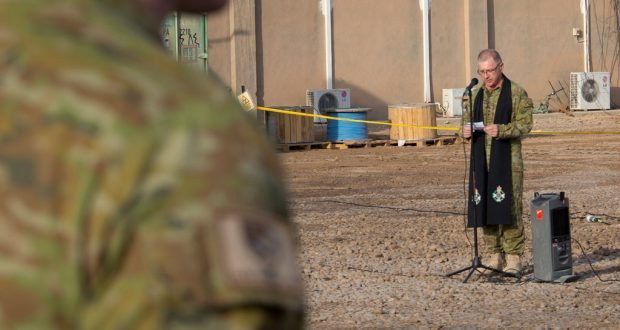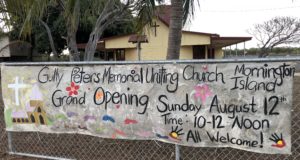Three chaplains working in the police force, the defence force and health care talk to Journey about bringing hope to others during the Christmas season and their own hopes for 2017.
Rev Doug Foster
Rev Doug Foster is a police chaplain for the Far North Police District incorporating north of Cardwell, Cairns, Cape York and the Torres Straits.
Journey: What does “hope” mean to you personally over this Christmas period?
Doug: For me the hope of Christmas is that people do not have to be defined by the outcome of their life’s circumstances. Christmas reminds us that God has a unique calling and life journey for each of us. And my hope is that there are some people who discover that unique calling this Christmas.
Journey: Could you please provide an example where you personally have been able to bring hope to others during the Christmas period as a police chaplain?
Doug: Several years ago, just prior to Christmas, our community experienced the tragic death of eight young people. It was horrendous for all the emergency services involved. It was so sad for them especially at that “family” time of the year.
Hopefully the time given to listening to them, and allowing them to talk about many other topics as well, meant they were able to relax and enjoy their own families. I must say it is often these officers who bring hope to their colleagues through the compassionate and professional way they work through tragedy.
Journey: Have you seen seemingly hopeless situations where the spirit of the Lord has been able to provide hope and change?
Doug: I would say the two large cyclones that have struck North Queensland over the last decade. As they were coming I know many people were praying across our nation and probably the world. On both occasions, I had numerous officers ask me to pray for an intervention to ensure life was not lost.
With the miracle of that occurring, a number of them came back and said that God had obviously been involved. I can’t say they experienced a “conversion” but they certainly expressed a belief that God turned a hopeless situation into one where people could recover.
Journey: What are the key challenges for you as a chaplain in the police force?
Doug: Having the privilege of providing pastoral care and support in a secular organization, I know that the Christian faith is neither an underpinning ideology or in any way important to the functioning of the organisation.
A major challenge it to discover the various ways pastoral care and support can be provided to people with varying faiths, ideologies, sexual preferences and cultures. It is an exciting and invigorating challenge.
Journey: What attracted you to serving the church in this particular field?
Doug: While in Congregational Ministry I had the opportunity to work with members of the Police Service through baptisms, weddings and funerals. I was given a position as a part-time Chaplain for several years, supporting local stations.
A number of major events occurred and I appreciated the diversity of pastoral roles and subsequent support given that the service required of me. When the full-time position became available, I was fortunate to transition into it. Since then I have been privileged to work with people dealing with the best and worst of our society through doing their duty.
Journey: How will you be celebrating the Christmas period?
Doug: I have the opportunity to have time to travel and spend Christmas with family, including several of my Granddaughters.
Journey: What signs of hope do you see over the Christmas season as a
police chaplain?
Doug: Sadly, Christmas creates financial and personal/family pressures on many in our society. The police are called to deal with this pressure when it erupts into violence/aggression/suicide. What I see is amazing men and women using their skills and powers to reduce the impact of these circumstances. And when it ends tragically, they show kindness and care for those who have suffered.
Journey: What are you hopeful for in 2017?
Doug: I am hopeful that in 2017 we will experience an outpouring of God’s graciousness that will result in us being a less judgmental and aggressive society.
Journey: What do you love most about the Uniting Church?
Doug: For me I have always loved the dynamic tension of the Uniting Church as it tries to remain in that messy middle of faith and society. I love that I have very close colleagues that have vastly differing theological understandings than me, but we can enjoy engaging with that difference.
I love that the Uniting Church has trained me and now allows me to explore and express the call I believe I have at present from God, even though for some it seems quite different to the Congregational ministry I have exercised.
Rev Tanya Richards
Rev Tanya Richards is the Pastoral Care Coordinator for the Metro North Hospital and Health Service, Brisbane.
Journey: What does “hope” mean to you personally over this Christmas period?
Tanya: For me hope is the expectation of new things. I believe hope offers us the chance to dream and imagine a way out of the suffering we encounter. In the context of a public hospital, sometimes the only thing people have left is hope, a hope that is life-changing and life-giving, but also a peaceful hope, at the end of life.
Hope reassures people that they are loved and held in the arms of God, in the midst of great pain, wonder and sorrow.
Journey: Could you please tell us a good story where you personally have been able to bring hope to others during the Christmas period as a hospital chaplain?
Tanya: This Christmas for the first time, we have been given the go ahead from Hospital Executive to run a Blue Christmas Service at the hospital for the staff.
We hope this will give space for staff at this time of Christmas craziness to remember those in their families, but also those they have worked with as patients who have died in the past year. Christmas is not always a happy event, for those who deal with death daily we hope to create a space for them grieve and remember.
Journey: Have you seen seemingly hopeless situations where the spirit of the Lord has been able to provide hope and change?
Tanya: Recently in our intensive care unit (ICU), we had a young patient who went for surgery at another hospital. The surgery did not go well and the patient had been transferred to Prince Charles. This patient is dangerously ill and has been in an induced coma for over a month.
The family reached out to pastoral care and we have been supporting them. Over the weeks the patient has improved and has been transferred to a less critical bed in ICU, and is now on a new road to recovery. As chaplains we offer support that brings to life the love of God for his people, helping the family with their struggle and the doubts of an unknown future. We offer the peace and comfort that is from the Spirit.
Journey: What are the key challenges for you as a chaplain in this specific field?
Tanya: The role of a public chaplain can certainly be a challenging one. As we work across a number of denominations and faith groups an increasing number of people identify as no faith. At times it’s a juggling act to keep the needs of all people at the focus of our work.
Working in a state government context also offers interesting but also exciting challenges as we find a way to work together to support patients and families and staff at their most vulnerable moments.
Journey: What attracted you to serving the church in a health care context?
Tanya: I first trained as a youth worker, and it was on my last practical placement that I travelled to Indonesia. It was this experience that opened my eyes and understanding to the struggles of people.
I returned to Australia knowing that I was being called to more than just youth ministry, so I went through the discerning process again and became a deacon in the Uniting Church. I have a deep passion and call to work with people from all backgrounds, and help them to see and know the love of God in their lives. Through my counselling training I’m able to match my ministry and counselling skills, to meet people at moments of crisis, joy, hope, struggle, pain, doubt and fear. In those moments I have the opportunity to represent Christ and his love and just be with people.
Journey: What signs of hope do you see over the Christmas season?
Tanya: As I walk around the hospital at Christmas time and see the effort staff have made to decorate their work space, I believe this brings hope and a sense of community and family for those who are absent from their own families at Christmas.
Journey: How will you be celebrating the Christmas period?
Tanya: After a very busy year, I will be spending some quiet time with family and friends.
Journey: What are you hopeful for in 2017?
Tanya: My hope is that the chaplaincy team at the Prince Charles Hospital continues to grow and expand and to be an integral part of the life of the hospital.
Journey: What do you love most about the Uniting Church?
Tanya: The Uniting Church I believe is leading the way in chaplaincy and offers opportunities for people outside of congregations to meet Christ.
It offers me the opportunity to express my call and passion to minister to people at the Prince Charles Hospital. I believe the Uniting Church is open to exploring new expressions of chaplaincy and meeting people where they are to offer the hope of Christ.
Rev Rob Packer
Rev Rob Packer is the chaplain for the 2/14 Light Horse Regiment (Queensland Mounted Infantry). Last year he was deployed to Iraq for seven months.
Journey: What does “hope” mean to you personally over this Christmas period?
Rob: Hope points beyond the moment and past the quick-fix attitude of many to the deeper realities of faith-shaped living. It is not about escaping pain, and often means enduring, and hopefully growing, through the inevitable struggles of life.
Journey: Could you please provide an example where you personally have been able to bring hope to others during the Christmas period as a defence chaplain?
Rob: One soldier came to me very distressed that a relative about his age had died unexpectedly. Over the next few weeks he really struggled as it opened up a whole lot of issues that shook him to the core.
We talked quite a few times as he dared peer into the unfamiliar and painful depths of his struggles. I told him regularly that I was praying for him. As Christmas approaches he is laughing again and looking forward to celebrating with his family.
Journey: What attracted you to serving the church in this particular field?
Rob: I love a challenge and after 22 years of local church ministry I was open to the call to a new challenge.
Previous part-time chaplaincy with police had given me an insight to what it might involve. After serving as a reserve chaplain for a few months the doors began to open and I really sensed God’s calling. That has been confirmed often.
Journey: What are the key challenges for you as a chaplain in the defence force?
Rob: Knowing when to listen, when to challenge, when to advocate for soldiers and when to offer some suggestions for seeing and doing things differently.
Although I filter out the swearing so that it doesn’t become a barrier, I want to hear the heart, not just the words people speak. And remembering names: there are over 400 people in my unit and it seems that every week there are new people marching in to the unit.
Journey: Have you seen seemingly hopeless situations where the spirit of the Lord has been able to provide hope and change?
Rob: I have seen soldiers come to me at their wits’ end about all kinds of situations—family issues, health concerns, financial problems. Mostly they do
not come seeking a solution, but someone to listen.
Confidentiality is crucial, and they know that talking with a chaplain means those issues will not be shared with others. There is often the sense that the chaplain has “something extra”, and many will say something along those lines. I offer to pray with most and regularly see people walk away with a new sense of hope. Tears have turned to laughter. I know it’s not me that has brought the change.
Journey: What signs of hope do you see over the Christmas season as a defence force chaplain?
Rob: I see people who are quite unyielding in their work role become more relaxed. I see people being more open about their faith.
There is a much greater desire to connect with family and friends because my sense is that people know connection is part of what Christmas is about. They may not be able to articulate that God is connected to humanity in a radically new way because of Christmas but they sense it at differing levels.
Journey: How will you be celebrating the Christmas period?
Rob: Christmas will be spent with two of our four daughters, attending worship, then my wife and I head off for a holiday.
Journey: What are you hopeful for in 2017?
Rob: I know it sounds like the “world peace” response of a beauty pageant, but I hope for more stability in the world despite how things are looking. More stability means less likelihood of our young men and women being put in harm’s way.
I am hopeful, as I prepare to post to a new unit, that I can inspire hope and faith in some of the people I meet and care for.
Journey: What do you love most about the Uniting Church?
Rob: The diversity, even though it also frustrates me at times. I love that we have the deep sense of becoming, of still developing, of being uniting, rather than claiming to be united. We don’t claim to be right, we have the sense that we are learning along the way. Working in a multi-denominational setting as the defence force is, I now realise how deeply that is part of our DNA as a church.
 JourneyOnline
JourneyOnline






